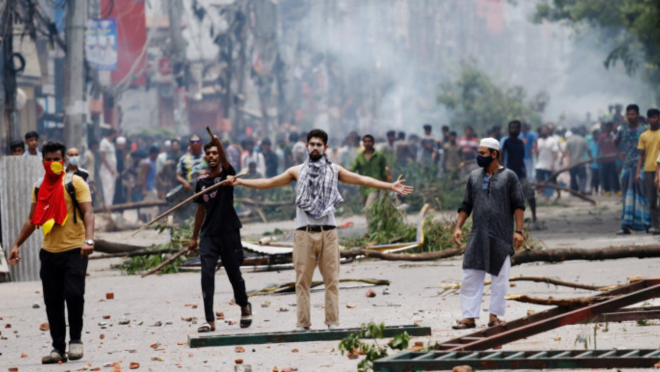Revisiting the July Revolution through the language of hope, unity and defiance
Revisiting the July Revolution through the language of hope, unity and defiance

From chants that rattled the gates of power to songs that lit up the streets, the July Revolution was as loud as it was lyrical. This was a movement heard before it was seen.
Here’s a look at the chants, voices, and verses that carried the July Revolution forward.
Slogans that shook the streets
One of the first chants to ring out during of the Bangla Blockade in the beginning of July, 2024 was “Quota na medha? Medha! Medha!” (Quota or merit? Merit! Merit!). It was a clear call for fairness in education. Not long after, tensions grew when the former prime minister Sheikh Hasina made a controversial comment, accusing students of acting against the country. In response, the halls of Dhaka University echoed with: “Tumi ke? Ami ke? Razakar, Razakar! Ke boleche? Ke boleche? Shairachar! Shairachar!” (Who are you? Who am I? Razakar! Razakar! Who has said? Who has said? Autocrat! Autocrat!). This shifted the tone of the protests, and chants like “Lakho shohider rokte kena, deshta karo baaper na” (Bought with the blood of millions of martyrs, the country isn’t your father’s) reminded everyone what was at stake.
When Abu Sayed stood infront of the police, giving his life, people recalled his heroic act throughout the movement with, “Buker bhetor tumul jhor, buk petechi guli kor” (A fierce storm within my heart, I lay my chest bare, shoot!). As lives were lost, sorrow gave rise to painful cries like, “Tor quota tui ne, amar bhai firiye de” (Take your quota back, return my brother). By early August, the demand grew louder and more direct: “Dafa Ek Daabi Ek, Khuni Hasinar Padatyag!” (One point, one demand, the resignation of killer Hasina!). Two slogans remained constant throughout: “Inqilab, Zindabad!” (Long live the revolution!) and “Bhoy pele tumi shesh, rukhe darale Bangladesh!” (If you fear, you’re finished; if you resist, Bangladesh rises!) , the latter mirroring the 2018 road safety movement.
Humour amidst the struggle
Despite all the tension, the nation turned strange government claims and political blunders into jokes, memes, and catchphrases that made people laugh and feel united. Hasina’s emotional appearances were met with the blunt “Natok kom koro piyo” (Tone down the drama, dear), while the desperate cries of BCL activists, “Oi mama na pls” (Hey bro, no please), turned into viral memes when they were caught by protesters. Former state minister for ICT, Palak’s excuse after the deliberate blackout, “Internet bondho korini, bondho hoye geche” (We didn’t shut down the internet, it just shut itself down), became a national joke.
When, after detaining the revolution leaders DB Harun-or-Rashid claimed he only invited them for lunch, many saw it as a scare tactic and soon, “DB Harun er bhater hotel” (DB Harun’s rice hotel) became a running phrase of mockery. And when the government tried to spread fake narratives, the youth responded with one sharp word “Chalaiden” (Run it online). Former minister of Road Transportation and Bridges, Obaidul Quader, infamously known as “Kauwa Kader”, was mocked with his own line “she has made us fly higher” after he and others fled the country. These bits of humour were more than just funny. They helped people feel braver and more connected, even in the middle of fear and chaos.
Echoes of loss and grief
Some words cut deeper than any slogan. In July 2024, it was these raw, grieving voices that shook the nation to its core. “Hamar betak marlu kene?” (Why did you kill my son?), cried Abu Sayeed’s mother, and her words echoed far beyond her home. “Amare jaite den na, amar ekta choto bon ache” (Please let me go, I have a little sister), cried a boy as he was being taken away by the police, which stirred the heart of every brother and sister. The famous line from Jahir Rayhan’s Arek Falgun – “Ashche fagun, amra hobo digun” (Next Spring, we will be doubled) was shouted and repeated by a captured student, not in fear but in faith, and that promise spread across the nation like wildfire.
A police sub-inspector, after losing his own teenage son, asked, “Ekjonke marte kotogulo guli lage sir?” (How many bullets does it take to kill someone, sir?). It was not just a question, but a wound spoken out loud. And then there was Riya Moni, a six-year-old girl who went to the rooftop to play and was shot dead. Her symbolic saying, “Biman!” (Plane!) represented a word full of wonder that carried unbearable weight. Martyr Mughdho, moments before he was shot, was simply asking, “Pani lagbe? Pani?” (Water? Do you need water?), a small act of kindness that became one of the most heartbreaking echoes of the protests.
Lyrics of change in the air
Music became the heartbeat of the movement. Protesters sang old and new songs, giving familiar tunes new meaning. From the stirring lines of Karar oi louho kopat and Dhono dhanno pushpe bhora to global hits like Hall of Fame, voices rose with strength. Alongside these classics, new songs like Awaj Utha by HANNAN, Shono Mohajon by the band Shunno, and Kotha ko by Shezan, not only captured the essence of the uprising but also gave rhythm to resistance.
The slogans, songs, humour, and heartfelt cries of July 2024 did more than fill the streets, they forged a shared spirit that fuelled a nation’s fight for justice and change. It was ultimately through these voices raised in defiance and hope, that the revolution found its unstoppable strength.


